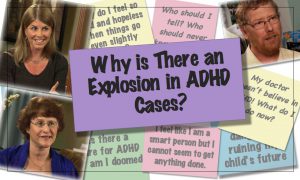What is Causing The Increase In ADHD Diagnosis?
Why the explosion in the number of cases of ADHD? Where were all these people before? The answer is complex. One reason for the explosion is it wasn’t recognized in adults until the late 80’s. Another is that every individual is very… individual. It’s so complex and has different variations. ADD, ADHD… But the fact remains that 80% or more of adults who fall into the spectrum, and are struggling with the symptoms, don’t realize what is going on. Many, too many, are resisting the diagnosis, or assuming this is how they’re built, or misdiagnosed with Depression or Anxiety.
Patrick McKenna – Why the explosion in number of cases?
[Dr. Margaret Weiss] we’ve broadened our concept from the bad boy, to a understanding of the disorder that encompasses both men and women all ages, and different forms of the disorder. There are patients who only have trouble paying attention and there are patients who focus very well but have difficulty with hyperactivity and/or impulsivity.
Dr. Umesh Jain: This is common in fact it’s the most common disorder in childhood, if you believe that five to nine percent of school-age children have this as little as in Canada that’s what it seems to be, and that sixty percent continue on to adulthood. That makes one and twenty five adults having ADHD so you’ve got to beg the question where are you hiding?
Patrick McKenna – So where were all these ADD’ers before?
They’re probably being misdiagnosed as something else because ADHD was not clarified and what we call the Diagnostic and Statistical Manual which is the way we diagnose phenomenon in psychiatry, because of confusion related to the way was first brought out in adults we probably are miss diagnosing it as things like anxiety disorders depression personality disorders people who have difficulties with bipolar or even high functioning Aspergers syndromes for example it overlaps a lot of different disorders in different ways learning disabilities for example.
Dr. Steven Kurtz: Truth be told when you look at kids who were kids with ADHD in the 60s and 70s who an hour in their 40s that the majority of those don’t meet criteria for ADHD any longer but the ones who do meet criteria for ADHD still need help they still have trouble organizing themselves they still have trouble with what we call the executive functions or organizational skills they tend not as adults to still be climbing couches and running into the street and blurting out some do but they tend to have outgrow it.
Dr. Annick Vincent: and there’s no too old age to treat ADHD you know they are adults with ADHD or over 70 or still taking their medication.
Dr Weiss: There is also a group of adults who have never been diagnosed who suddenly have that aha experience they’ve wondered why they had to read for four hours to get a half an hour of reading comprehension or they’ve wondered why they have to move so persistently in order just to feel comfortable or why they couldn’t rest or their difficulties with relationships in those individuals integrating this new intervention and new understanding into their self-concept means rewriting their whole life history and that’s a very large task and it’s an ongoing task which when you start in middle age is difficult.
View related videos
View related blog posts


Leave A Comment
You must be logged in to post a comment.